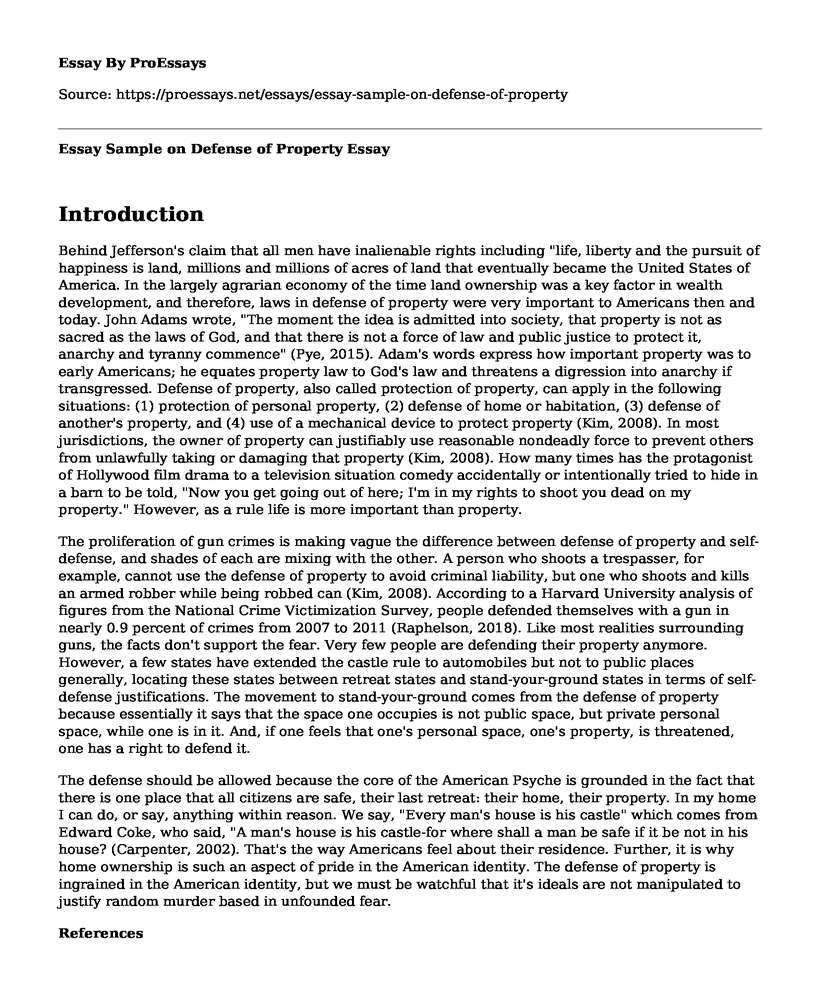Introduction
Behind Jefferson's claim that all men have inalienable rights including "life, liberty and the pursuit of happiness is land, millions and millions of acres of land that eventually became the United States of America. In the largely agrarian economy of the time land ownership was a key factor in wealth development, and therefore, laws in defense of property were very important to Americans then and today. John Adams wrote, "The moment the idea is admitted into society, that property is not as sacred as the laws of God, and that there is not a force of law and public justice to protect it, anarchy and tyranny commence" (Pye, 2015). Adam's words express how important property was to early Americans; he equates property law to God's law and threatens a digression into anarchy if transgressed. Defense of property, also called protection of property, can apply in the following situations: (1) protection of personal property, (2) defense of home or habitation, (3) defense of another's property, and (4) use of a mechanical device to protect property (Kim, 2008). In most jurisdictions, the owner of property can justifiably use reasonable nondeadly force to prevent others from unlawfully taking or damaging that property (Kim, 2008). How many times has the protagonist of Hollywood film drama to a television situation comedy accidentally or intentionally tried to hide in a barn to be told, "Now you get going out of here; I'm in my rights to shoot you dead on my property." However, as a rule life is more important than property.
The proliferation of gun crimes is making vague the difference between defense of property and self-defense, and shades of each are mixing with the other. A person who shoots a trespasser, for example, cannot use the defense of property to avoid criminal liability, but one who shoots and kills an armed robber while being robbed can (Kim, 2008). According to a Harvard University analysis of figures from the National Crime Victimization Survey, people defended themselves with a gun in nearly 0.9 percent of crimes from 2007 to 2011 (Raphelson, 2018). Like most realities surrounding guns, the facts don't support the fear. Very few people are defending their property anymore. However, a few states have extended the castle rule to automobiles but not to public places generally, locating these states between retreat states and stand-your-ground states in terms of self-defense justifications. The movement to stand-your-ground comes from the defense of property because essentially it says that the space one occupies is not public space, but private personal space, while one is in it. And, if one feels that one's personal space, one's property, is threatened, one has a right to defend it.
The defense should be allowed because the core of the American Psyche is grounded in the fact that there is one place that all citizens are safe, their last retreat: their home, their property. In my home I can do, or say, anything within reason. We say, "Every man's house is his castle" which comes from Edward Coke, who said, "A man's house is his castle-for where shall a man be safe if it be not in his house? (Carpenter, 2002). That's the way Americans feel about their residence. Further, it is why home ownership is such an aspect of pride in the American identity. The defense of property is ingrained in the American identity, but we must be watchful that it's ideals are not manipulated to justify random murder based in unfounded fear.
References
Carpenter, C. L. (2002). Of the Enemy Within, the Castle Doctrine, and Self-Defense. Marq. L. Rev., 86, 653. Retrieved from http://scholarship.law.marquette.edu/mulr/vol86/iss4/1
Kim, J. Y. (2008). The Rhetoric of Self-Defense. Berkeley J. Crim. L., 13, 261.
Pye, J. (2015). Donald Trump versus the Founding Fathers: Private property rights are the cornerstone of liberty. Retrieved from https://www.freedomworks.org/content/donald-trump-versus-founding-fathers-private-property-rights-are-cornerstone-libertyRaphelson, S. (2018, April 13). How Often Do People Use Guns in Self-Defense? Retrieved from https://www.npr.org/2018/04/13/602143823/how-often-do-people-use-guns-in-self-defense
Cite this page
Essay Sample on Defense of Property. (2022, Nov 22). Retrieved from https://proessays.net/essays/essay-sample-on-defense-of-property
If you are the original author of this essay and no longer wish to have it published on the ProEssays website, please click below to request its removal:
- Domestic Violence Courts Essay Example
- Essay Sample on John F Kennedys Murder
- Essay Sample on Murder Among the Teenagers
- Essay Example on Juvenile Justice: Processing Criminal Behaviors of Youths Aged 17 and Below.
- Essay Example on Crime Scene Investigation: Uncovering Hidden Evidence
- Essay Example on Predatory Crime: A Dualistic Relationship of Conflict & Consensus
- Gideon's Book: Revolutionizing Judicial Systems in the U.S. - Essay Sample







